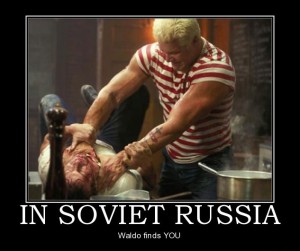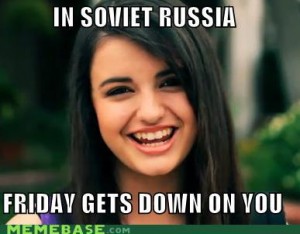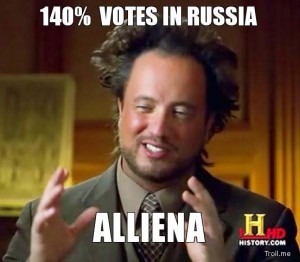A mistaken classification: Russian =/ democracy?
The Putinian universe appears to be unfolding as planned. Vladimir Putin has been elected to a third term as president. His loyal place-holder, Dmitri Medvedev, will either become prime minister, or be dispensed with – his services having been rendered, the spirit of Russia’s constitutional term limits duly thwarted.
Yet the victory tears shed by Mr. Putin on Sunday aside, this is a dangerous moment for Russia.
December’s parliamentary elections were characterized by election-rigging that provoked demonstrations across the country. The bar was raised for the presidential vote. Unfortunately, Mr. Putin has not successfully scaled it. His re-election by a large margin was secured on the basis of conditions “clearly skewed in favour of one candidate,” as observers from the Organization for Co-operation and Security in Europe dryly put it. This only serves to emphasize the perception of a prearranged handover of power.
The presidential election’s flaws had less to do with procedural irregularities on polling day – though those were reported, too – than with a system of unfairness leading up to the predictable result. Restrictive electoral regulations prevented genuine competition; official and coerced media fanned the cult of personality around Mr. Putin and denied his opponents equal time; and the apparatus of the state, with its legion of salaried supporters, was placed at his disposal.
European observers determined that “the election had a clear winner with an absolute majority.” But with such advantages, anything but a landslide would have been unthinkable.
A managed democracy, as the Putinists would practise it, is not a true democracy. What has become clear these past three months, as the demonstrations have continued, is that Russians themselves agree that this is not an acceptable approach to democracy – and a democracy is what Russia nominally is and aspires to be. It is why, for example, the country – unlike China – is a member of the G8 group of industrialized democracies.
In responding to the result, the White House on Monday moved delicately, on the one hand, congratulating the Russian people for voting in large numbers, on the other expressing concern over the conduct of the vote, and pointedly neglecting to mention Vladimir Putin by name. The international community, particularly the G8 countries including Canada, is in an awkward position. It needs to censure Mr. Putin, yet should do so in a way that appeals to his better angels, should they exist.
The chaos of the immediate post-Soviet era is now well in the past. It is Russia’s fragile democratic institutions that need staunch defenders. The Russian people need to speak out more clearly; Mr. Putin should listen to them. Now that he has full control, he can afford to rule with a looser grip. He should not prevent a Russian spring, but lead it.



0 comments
Kick things off by filling out the form below.
Leave a Comment